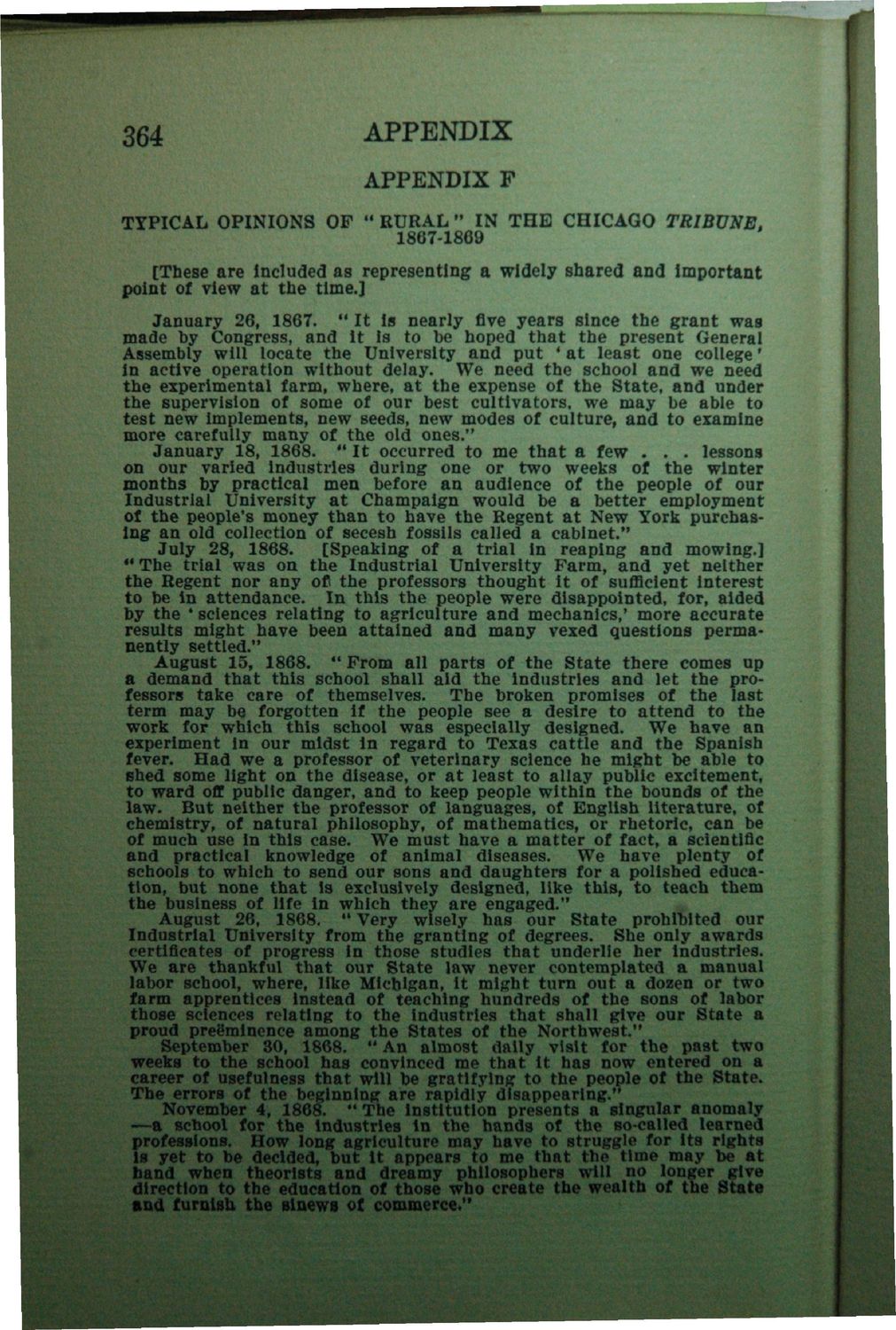| |
| |
Caption: Book - History of the University (Nevins)
This is a reduced-resolution page image for fast online browsing.

EXTRACTED TEXT FROM PAGE:
364 APPENDIX APPENDIX P TYPICAL OPINIONS OF " BUBAL" IN THE CHICAGO TRIBUNE, 1867-1869 [These are included as representing a widely shared and important point of view at the time.] January 26, 1867. " It is nearly fire years since the grant was made by Congress, and it is to be hoped that the present General Assembly will locate the University and put ' a t least one college' in active operation without delay. We need the school and we need the experimental farm, where, at the expense of the State, and under the supervision of some of our best ecutiva tors, we may be able to test new implements, new seeds, new modes of culture, ana to examine more carefully many of the old ones." January 18, 1868. " It occurred to me that a few • i . lessons on our varied industries during one or two weeks of the winter months by practical men before an audience of the people of our Industrial University at Champaign would be a better employment of the people's money than to have the Regent at New York purchasing an old collection of secesb fossils called a cabinet." July 28, 1868. [Speaking of a trial in reaping and mowing.] "The trial was on the Industrial University Farm, and yet neither the Regent nor any oft the professors thought it of sufficient interest to be in attendance. In this the people were disappointed, for, aided by the * sciences relating to agriculture and mechanics/ more accurate results might have been attained and many vexed questions permanently settled." August 15, 1868. "From all parts of the State there comes up a demand that this school shall aid the industries and let the pro* fessors take care of themselves. The broken promises of the last term may be forgotten if the people see a desire to attend to the work for which this school was especially designed. We have an experiment In our midst in regard to Texas cattle and the Spanish fever. Had we a professor of veterinary science he might be able to shed some light on the disease, or at least to allay public excitement, to ward off public danger, and to keep people within the bounds of the law. But neither the professor of languages, of English literature, of chemistry, of natural philosophy, of mathematics, or rhetoric, can be of much use In this case. We must have a matter of fact, a scientific and practical knowledge of animal diseases. We have plenty of schools to which to send our sons and daughters for a polished education, but none that is exclusively designed, like this, to teach them the business of life in which they are engaged." August 26, 1868. " Very wisely has our State prohibited our Industrial University from the granting of degrees. She only awards certificates of progress in those studies that underlie her industries. We are thankful that our State law never contemplated a manual labor school, where, like Michigan, It might turn out a dozen or two farm apprentices instead of teaching hundreds of the sons of labor those sciences relating to the industries that shall give our State a proud preeminence among the States of the Northwest." September 30, 1868. "An almost dally visit for the past two weeks to the school has convinced me that it has now entered on a career of usefulness that will be gratifying to the people of the State. The errors of the beginning aire rapidly disappearing/' November 4, 1868. " The institution presents a singular anomaly - H I school for the industries in the hands of the so-called learned professions. How long agriculture may have to struggle for Its rights is yet to be decided, but it appears to me that the time may be at band when theorists and dreamy philosophers will no longer give direction to the education of those who create the wealth of the State and furnish the sinews of commerce."
| |